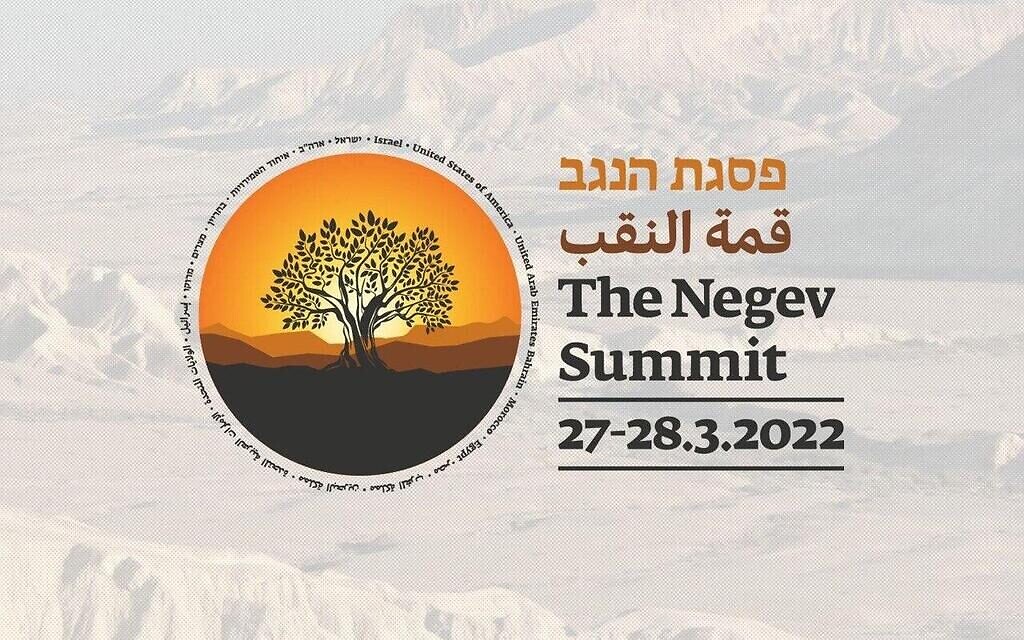A budding strategic alignment aimed at countering and containing Iran and its allies is emerging in the Middle East.
At the historic two-day Negev summit in Israel, which ended on March 28 after 18 hours of deliberations, the U.S. secretary of state and the foreign ministers of four Sunni Arab countries discussed the formation of an informal alliance to counter a common and increasingly dangerous enemy — Iran, the preeminent Shi’a Muslim power in the region.
The unprecedented meeting, a significant marker of Israel’s gradual acceptance and integration into the Arab world, took place in Sde Boker, a kibbutz in the northern Negev desert. Israel’s first prime minister, David Ben-Gurion, lived here for a while, and it is where he and his wife, Paula, are buried.
Jerusalem, Israel’s capital, could have been chosen as the venue of the summit. But because Jerusalem is a contested city and so politically encumbered, Sde Boker emerged as its relatively neutral site.
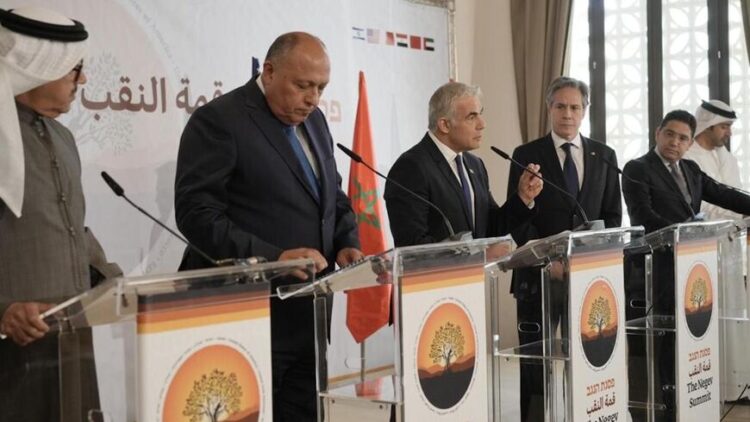
Organized and hosted by Israeli Foreign Minister Yair Lapid, it was attended by U.S. Secretary of State Antony Blinken, Egyptian Foreign Minister Samah Shoukry, Moroccan Foreign Minister Nasser Bourita, the United Arab Emirates’ Foreign Minister Sheikh Abdullah bin Zayed al-Nahyan, and Bahraini Foreign Minister Abdullatif bin Rashid al-Zayani.
Jordan — the second Arab state after Egypt to sign a peace treaty with Israel and the custodian of the Al Aqsa mosque in Jerusalem, the third holiest site in Islam — conspicuously did not send a representative to Sde Boker.
A possible reason is that the summit virtually ignored the simmering Palestinian issue, which is of paramount importance in Jordan, two-thirds of whose population is of Palestinian descent.
Cognizant of this demographic imperative, King Abdullah II of Jordan opted to confer with Palestinian Authority President Mahmoud Abbas in Ramallah on March 28. It was his first trip to the West Bank since 2017. Last month, he invited Lapid to Amman for talks.
Jordan’s snub did not dampen Lapid’s enthusiasm.
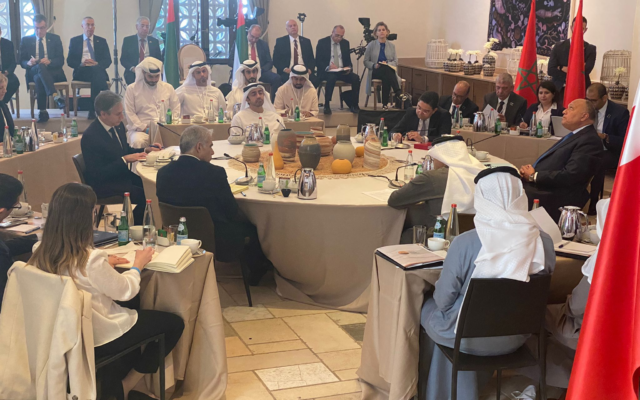
“What we are doing here is making history — building a new regional architecture based on progress, technology, religious tolerance, security and intelligence cooperation,” he said in a bold declaration of intent. “This new architecture and shared capabilities we are building intimidates and deters our common enemies — first and foremost Iran and its proxies.”
According to Lapid, the summit, the first of anticipated regular gatherings to assess regional developments, will become “a permanent forum.”
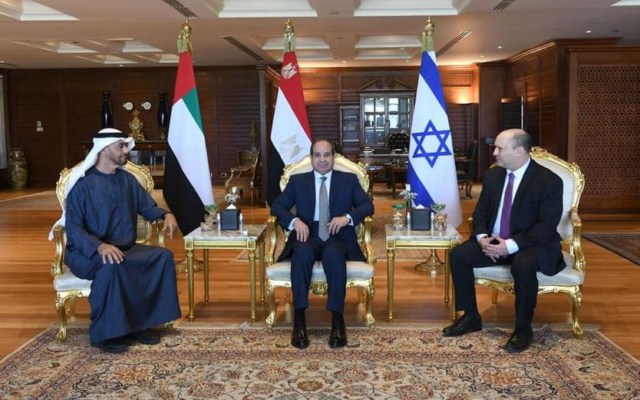
Predictably, Iran described the summit as an “evil conference” and a “betrayal of Palestinian aspirations for freedom.” Saeed Khatibzadeh, the Iranian foreign ministry spokesman, said, “Any measures to normalize and establish relations with Zionist terrorists and occupiers of Jerusalem is a stab in the back of Palestinian people.”
The summit unfolded only days after the leaders of Israel, Egypt and the United Arab Emirates, Prime Minister Naftali Bennett, President Abdel Fattah el-Sisi and Crown Prince Mohammed bin Zayed, conferred in the Red Sea resort of Sharm el-Sheikh to discuss matters of mutual interest.
High on the agenda was Iran, which wields enormous influence in Syria, Lebanon, Iraq and Yemen and which has formed an informal “axis of resistance” consisting of the Syrian government, Hezbollah and Hamas, all of which are Israel’s sworn enemies.
As the conference in Sde Boker got underway, Houthi rebels in Yemen, which are supported by Iran, fired drones and missiles at two major cities in Saudi Arabia, Jeddah and Riyadh. Saudi Arabia has been targeted by the Houthis because of its military involvement in Yemen’s civil war.
These barrages prompted Bennett to issue an unusual condemnation.
“The State of Israel expresses its sorrow to the Kingdom of Saudi Arabia after the horrific attack by the Iranian-backed Houthis,” he said in a statement. “This attack is further proof that Iran’s regional aggression known no bounds.”
Israel has no formal ties with Saudi Arabia, but would gladly establish diplomatic relations with the Saudis if they were so inclined. Both countries, though, regard Iran as a looming threat.
To conservative, pro-American Arab states like Egypt and the United Arab Emirates, Iran’s hegemonic regional ambitions are just as troubling as its militarized nuclear program, which is of great concern to Israel.
Under a 2015 landmark agreement signed by Iran and the United States, Russia, China, Britain, France and Germany, Iran’s nuclear program was effectively frozen in exchange for sanctions relief. But in 2018, the then U.S. president, Donald Trump, unilaterally pulled out of it, prompting Iran to violate several of its key provisions.
For almost a year now, the signatories have been trying to revive it in complex, sometimes acrimonious talks in Vienna. Their arduous negotiations appear to have been fruitful. A new accord is expected to be announced shortly.
Its broad objective is to prevent Iran from building a nuclear arsenal. Israel and its Arab partners doubt whether Iran will abide by the agreement and believe that if a new deal is reached and the Biden administration lifts some sanctions on Iran, the Iranian regime will be in a better position to fund its weapons programs as well as its proxies in the area.
Although Iran is a menacing problem, it is not the sole issue concerning Israel and Arab states like the United Arab Emirates and Morocco.
On the eve of the Sde Boker summit, senior Israeli military officials arrived in Rabat, the capital of Morocco, to wrap up talks concerning the possibilities of military collaboration in the spheres of training and intelligence. Several high-ranking Israeli army officers, including Tal Kelman and Effie Defrin, who are respectively in charge of Iranian affairs and international cooperation, conferred with the head of Morocco’s armed forces, Belkhir el-Farouk, in a first-of-its-kind meeting.
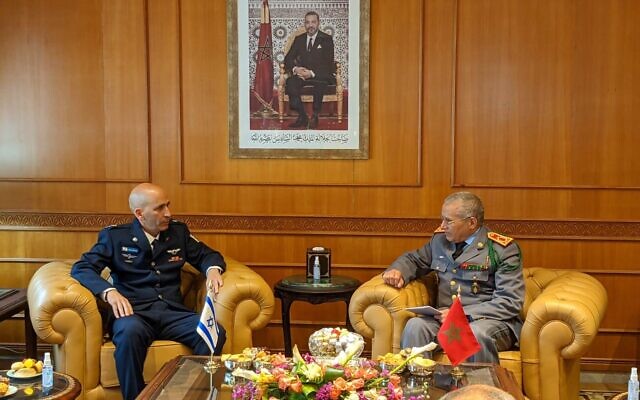
Around the same time, Amir Peretz, the president of Israel Aerospace Industries, Israel’s largest defence company, and the Moroccan Minister of Industry Ryad Mezzour signed a memorandum of understanding. Details were not disclosed.
These meetings unfolded following recent trips to Morocco by Israeli Defence Minister Benny Gantz and his colleague, Economy Minister Orna Barbivai, to sign cooperation agreements in the fields of security, technology and trade. By that point, Morocco’s flagship air carrier, Air Maroc, had already agreed to start direct flights from Casablanca to Tel Aviv.
These developments would not have materialized without the 2020 Abraham Accords, which enabled Israel to normalize its bilateral relations with the United Arab Emirates, Bahrain, Sudan and Morocco within an astonishing four-month period.
The Trump administration, in one of its most tangible achievements, played a pivotal role in laying the groundwork for these accords.
At the Sde Boker summit, Blinken recognized their importance in paving the way for Israel’s current cooperation with certain Arab states. “Just a few years ago, this gathering would have been impossible to imagine,” he said, noting that senior Israeli officials from Bennett on down have visited Bahrain and the United Arab Emirates in recent months. He also pointed out that Israel and its new Arab interlocutors have signed a rash of economic, solar and energy deals and have agreed to student exchanges.
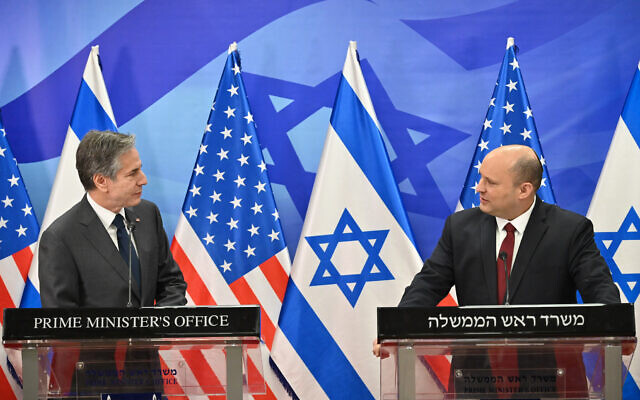
“The United States has and will continue to strongly support this process, which is transforming the region and beyond,’’ he said, adding that he would assist Israel in expanding the circle of Muslim countries interested in friendship and peace.
However, Blinken correctly warned that, as valuable as the accords are in promoting peace, they do not address Israel’s unresolved conflict with the Palestinians or the practical and moral need for a two-state solution. Prior to the summit, Blinken met Abbas in Ramallah, its de facto headquarters.
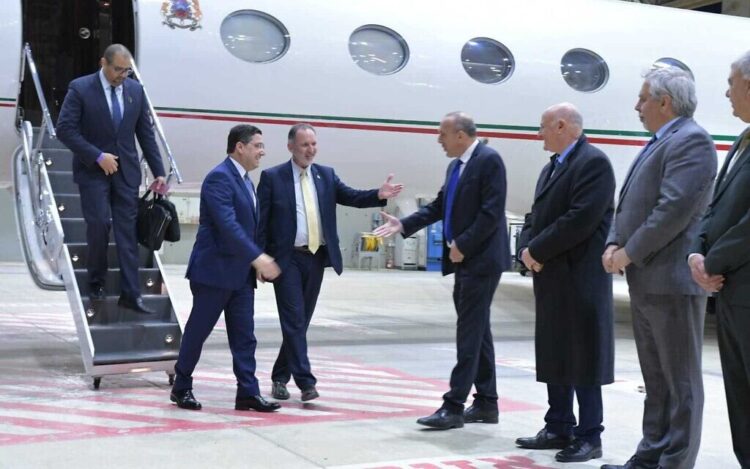
Bourita and Shoukry also endorsed Palestinian statehood within the framework of a peace agreement that respects Israel’s security requirements.
The Palestinian Authority, not having been invited to the summit, denounced it as a betrayal of the Palestinian cause. Although the Palestinian Authority refrained from condemning the Arab participants, its foreign ministry said that Israel was using the summit to suppress the Palestinian problem.
As the ministry put it, “This Israeli mobilization aims to cover up its actions of deepening settlement expansion and creeping annexation, Judaizing Jerusalem and preventing the establishment of a Palestinian state.”
The Palestinian issue certainly must be settled once and for all if stability is to prevail. If left unattended to fester, it will blow up yet again in Israel’s face.
